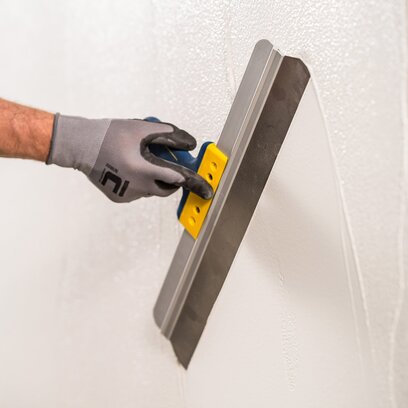Thanks to its special crystalline structure, gypsum can absorb excess moisture in the room air and release it back later when the room air is dry. In this way, the plaster regulates the humidity in the room and ensures a healthy and pleasant living climate. It also prevents the formation of mould.
However, plaster is very sensitive to moisture and should not be used in damp or wet rooms. It can also be brittle and tends to crack on impact. As a result, gypsum plasters are not as durable as cement or lime plasters and need to be repaired more frequently.
The advantage is that gypsum plaster hardens quickly and is therefore suitable for projects with time constraints. It offers good thermal and acoustic insulation properties. In addition, gypsum is naturally resistant to fire.



